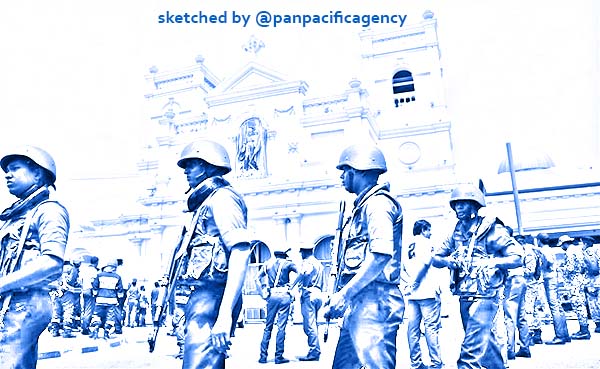Sri Lanka awaits results as pandemic precautions delay vote count

Security staff stand on guard outside the St. Anthony's Church where a blast took place in Colombo, Sri Lanka, April 21, 2019. (Xinhua / A.Hapuarachchi). Sketched by the Pan Pacific Agency.
COLOMBO, Aug 5, 2020, DPA. Health precautions due to the coronavirus pandemic slowed down voting in Sri Lanka’s parliamentary election on Wednesday, which is expected to deliver a stronger mandate for the ruling party, DPA reported.
Turnout was at 71 per cent according to the chairman of the Election Commission, Mahinda Deshapriya, after polling closed at 5 pm (1130 GMT), following a one-hour extension to voting hours.
At the last parliamentary elections in 2015, 77 per cent of eligible voters cast a ballot, while in the presidential elections in November the turnout was 84 per cent.
President Gotabaya Rajapaksa said however that the turnout was a show of confidence in the government.
“As the first South Asian country to hold general elections amidst Covid-19, it reflects the confidence that Sri Lankans have in our efforts to control this pandemic,” Rajapaksa said in a Twitter message.
The elections are expected to expand the power of the governing party, which is chasing a majority of two-thirds in the Sri Lankan parliament.
President Gotabaya Rajapaksa and his brother, Prime Minister Mahinda Rajapaksa, who is seeking another term, headed the campaign for the Sri Lanka Podujana Peramuna (Sri Lanka People’s Front).
“This election has been relatively calm compared to previous elections”, said Rohana Hettiaarachchi, the executive director for the election monitoring group Peoples’ Action for Free and Fair Elections.
The voting process was hampered by strict health guidelines that included sanitization measures, social distancing and compulsory face masks.
Authorities deployed more than 15,000 health officials and public health inspectors to enforce the safety measures. Such additional expenses helped push the cost of the poll up to 10 billion Sri Lankan rupees (54 million dollars), from the usual cost of around 6 billion rupees.
The elections were delayed twice due to the coronavirus pandemic.
Vote counting has been postponed until Thursday as an additional health precaution for officials and representatives of political parties.
Results which usually would have been delivered on the day of the elections will now be released only from Thursday evening.
The ballot boxes have been placed under high security at the counting centres overnight where representatives of parties contesting are also able to help guard the boxes.
More than 16.2 million people were registered to vote to elect members to the 225-seat parliament for a five-year term.
President Rajapaksa urged voters to give his party a two-thirds majority in parliament – which would give him greater power to push through an agenda that includes amending the constitution – but observers say he is unlikely to succeed.
The president wants to remove certain constitutional provisions, for instance regarding the appointment of key officials, which he says are an obstacle to ruling the country.
Rajapaksa has already appointed several former army officers to top civil administration positions. He is a former military officer who played a key role as defence secretary in defeating the Tamil rebels in 2009, ending a 26-year conflict.
The main opposition, the United National Party led by former prime minister Ranil Wickremesinghe, is badly divided.
Most of its previously popular candidates are running under the banner of a separate party, known as the Samagi Jana Balawegaya (United People’s Front) and led by former presidential candidate Sajith Premadasa.